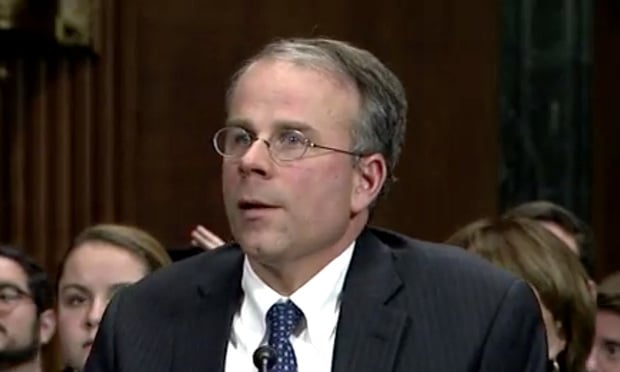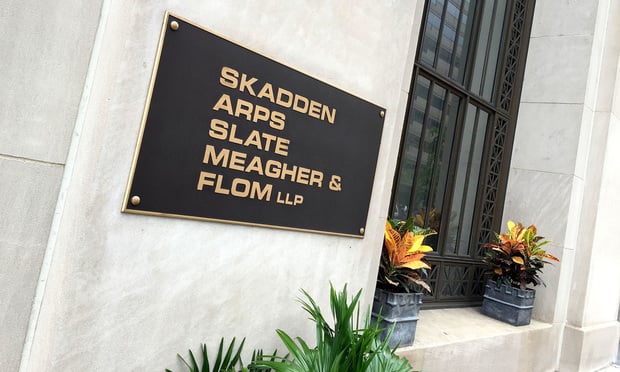How a Trump-Appointed Judge's Recusal Sped Up Indiana's Anti-Abortion Challenge
Michael Scudder, a former Skadden partner in Chicago, belatedly recused in the Indiana abortion case that would go to the Supreme Court. His former firm was representing an amicus party in the case in the Seventh Circuit.
May 29, 2019 at 03:24 PM
7 minute read
 Michael Y. Scudder during his confirmation hearing before the Senate Judiciary Committee to be a U.S. circuit judge for the Seventh Circuit on March 21, 2018.
Michael Y. Scudder during his confirmation hearing before the Senate Judiciary Committee to be a U.S. circuit judge for the Seventh Circuit on March 21, 2018.
The recusal of a Trump-appointed appellate judge in an Indiana abortion law challenge indirectly propelled to the U.S. Supreme Court the greatest recent threat to the landmark reproductive rights cases Roe v. Wade and Planned Parenthood v. Casey.
But the justices on Tuesday balked. They said too few federal appeals courts had reviewed state laws that would ban women from choosing an abortion, prior to viability, based on race, sex and disability.
In an unsigned opinion, the Supreme Court in the case Box v. Planned Parenthood of Indiana and Kentucky upheld Indiana's requirement that fetal remains be buried or cremated. But the justices declined to review the Indiana provision that restricts previability abortions, a time when a woman's right to choose has its strongest protection from state interference.
Both parts of the Indiana law had been enjoined by a federal district court, and that ruling was affirmed by a 2-1 panel of the U.S. Court of Appeals for the Seventh Circuit. The panel majority concluded that the provisions on selective abortions “clearly violate well-established Supreme Court precedent holding that a woman may terminate her pregnancy prior to viability.”
How the case got to the Supreme Court as a petition on the merits of the Indiana law on previability abortions stems in part from the recusal of a newly appointed member of the Seventh Circuit: Michael Scudder, a former Skadden, Arps, Slate, Meagher & Flom partner in Chicago who joined the bench in May 2018.
Indiana had only appealed the fetal remains injunction to the en banc Seventh Circuit, and there, Scudder voted with a majority of his colleagues on June 8 to rehear the panel decision that upheld the injunction.
The full Seventh Circuit's decision to take a fresh look at the dispute had the effect of erasing the panel ruling that upheld the injunction against the state's fetal remains law. Because the court had not been asked to rehear the provisions barring abortions based on sex, race or disability, that injunction remained in place.
But on June 25, the appeals court issued an order noting that a member of the court—Scudder—had become aware he was ineligible to vote on the rehearing petition and, therefore, could not participate in the new arguments. Several months before Scudder was appointed to the appeals court, Skadden lawyers, serving pro bono, had filed an amicus brief supporting the Planned Parenthood challengers. The participation of the firm could have given rise to a recusal issue.
Scudder's recusal meant that the Seventh Circuit was evenly divided, and the divided court could not rehear Indiana's push to take up the fetal remains law. The appellate court reinstated the three-judge panel decision, and that move opened the door for Indiana to appeal both issues—the fetal remains provision and the previability restrictions—to the Supreme Court.
Two other Trump-appointed judges—Amy Coney Barrett and Michael Brennan—had wanted to rehear the case with Scudder. Five other judges, including Amy St. Eve, who also was appointed by Trump, had voted against Indiana's rehearing request.
Scudder's planned recusals in Skadden cases
Why didn't Indiana appeal the previability abortion ruling to the en banc federal appeals court? Chief Judge Diane Wood said in the June 25 court order that “the reason why is obvious: only the U.S. Supreme Court has the power to decide whether to change the rule of Planned Parenthood of Southeastern Pennsylvania v. Casey.”
That rule says states cannot “prohibit any woman from making the ultimate decision to terminate her pregnancy before viability.”
In its Tuesday opinion, the Supreme Court said its refusal to review Indiana's previability abortion law was based on the justices' practice of declining to take up cases when only one court has considered an issue.
“Only the Seventh Circuit has thus far addressed this kind of law. We follow our ordinary practice of denying petitions insofar as they raise legal issues that have not been considered by additional Courts of Appeals,” the justices said in their ruling. The court said it “expresses no views on the merits” of Indiana's previability abortion law.
Indiana Solicitor General Thomas Fisher, in his Supreme Court petition, identified Scudder as the judge who stepped aside from his initial vote on en banc review. “Given that Indiana is barred by a final judgment and injunction from enforcing the fetal disposition provision, it will be unable to litigate the validity of the statute in another case where Judge Scudder will not be recused,” Fisher wrote.
 Skadden, Arps, Slate, Meagher & Flom's Washington, D.C. offices. Photo by Diego M. Radzinschi/THE NATIONAL LAW JOURNAL.
Skadden, Arps, Slate, Meagher & Flom's Washington, D.C. offices. Photo by Diego M. Radzinschi/THE NATIONAL LAW JOURNAL.Scudder did not respond to a request for comment on the reason why he recused about two weeks after voting to reconsider the panel ruling that blocked Indiana's fetal remains law. In his Senate questionnaire, Scudder said “for a period of time, I anticipate recusing myself in all cases where my current law firm, Skadden, Arps, Slate, Meagher & Flom LLP, represents a party.”
Skadden, indeed, was involved in the Indiana abortion case. Skadden litigation partners Geoffrey Wyatt and Jessica Miller represented Disability Advocates as an amicus party in support of Planned Parenthood's challenge to Indiana's abortion law.
Skadden's involvement in the case was not immediately apparent on the face of the amicus brief. The Skadden lawyers were not using their Skadden email addresses but, instead, an address that identified “@probonolaw.com.” The lawyers' connection to Skadden was identified on a required circuit disclosure statement, and the attorneys used Skadden's Washington, D.C., address on court papers.
Skadden lawyers have used the “@probonolaw.com” email address on a number of cases.
Ronald Tabak, Skadden's special counsel for global pro bono, said the original purpose of the address was to allow lawyers to work on potentially controversial subjects, with the firm's full backing, but without causing any greater concerns, particularly with lawyers who might disagree with that side of a case.
“It was a way to enable people to do that work,” Tabak said. “When I first came in 1985, we didn't do things in the firm name in any pro bono area. People wondered whether the firm name should be associated with death penalty work. These days in death penalty cases, we do all of them in the firm name.”
The justices in the Indiana case avoided, for now, a direct challenge to their landmark abortion rights precedents. Abortion is still on the docket in pending petitions for review from Louisiana, Alabama and Indiana and more cases are in the pipeline to the high court.
Read more:
Justices Issue Split Ruling in Indiana Abortion Case, Blocking Part of State Law
The Justices Had 5 Votes to Overturn 'Roe' in 1992. Why That Didn't Happen.
Why Roberts Sided With Liberals Blocking Restrictive Louisiana Abortion Law
Justice Thomas Accuses Colleagues of Sidestepping Abortion-Related Disputes
Skadden's Michael Scudder Confirmed to 7th Circuit, Succeeding Posner
This content has been archived. It is available through our partners, LexisNexis® and Bloomberg Law.
To view this content, please continue to their sites.
Not a Lexis Subscriber?
Subscribe Now
Not a Bloomberg Law Subscriber?
Subscribe Now
NOT FOR REPRINT
© 2025 ALM Global, LLC, All Rights Reserved. Request academic re-use from www.copyright.com. All other uses, submit a request to [email protected]. For more information visit Asset & Logo Licensing.
You Might Like
View All
Apple Files Appeal to DC Circuit Aiming to Intervene in Google Search Monopoly Case
3 minute read
DC Circuit Revives Firefighters' Religious Freedom Litigation in Facial Hair Policy Row
3 minute read
Judges Split Over Whether Indigent Prisoners Bringing Suit Must Each Pay Filing Fee

4th Circuit Upholds Virginia Law Restricting Online Court Records Access
3 minute readTrending Stories
- 1Carol-Lisa Phillips to Rise to Broward Chief Judge as Jack Tuter Weighs Next Move
- 2Data Breaches in UK Legal Sector Surge, According to ICO Data
- 3Georgia Law Schools Seeing 24% More Applicants This Year
- 4After Shutting USAID, Trump Eyes Department of Education, CFPB
- 5‘Keep Men Out’: Female Swimmers Sue Ivy Leagues Over Lia Thomas’ Sweep
Who Got The Work
J. Brugh Lower of Gibbons has entered an appearance for industrial equipment supplier Devco Corporation in a pending trademark infringement lawsuit. The suit, accusing the defendant of selling knock-off Graco products, was filed Dec. 18 in New Jersey District Court by Rivkin Radler on behalf of Graco Inc. and Graco Minnesota. The case, assigned to U.S. District Judge Zahid N. Quraishi, is 3:24-cv-11294, Graco Inc. et al v. Devco Corporation.
Who Got The Work
Rebecca Maller-Stein and Kent A. Yalowitz of Arnold & Porter Kaye Scholer have entered their appearances for Hanaco Venture Capital and its executives, Lior Prosor and David Frankel, in a pending securities lawsuit. The action, filed on Dec. 24 in New York Southern District Court by Zell, Aron & Co. on behalf of Goldeneye Advisors, accuses the defendants of negligently and fraudulently managing the plaintiff's $1 million investment. The case, assigned to U.S. District Judge Vernon S. Broderick, is 1:24-cv-09918, Goldeneye Advisors, LLC v. Hanaco Venture Capital, Ltd. et al.
Who Got The Work
Attorneys from A&O Shearman has stepped in as defense counsel for Toronto-Dominion Bank and other defendants in a pending securities class action. The suit, filed Dec. 11 in New York Southern District Court by Bleichmar Fonti & Auld, accuses the defendants of concealing the bank's 'pervasive' deficiencies in regards to its compliance with the Bank Secrecy Act and the quality of its anti-money laundering controls. The case, assigned to U.S. District Judge Arun Subramanian, is 1:24-cv-09445, Gonzalez v. The Toronto-Dominion Bank et al.
Who Got The Work
Crown Castle International, a Pennsylvania company providing shared communications infrastructure, has turned to Luke D. Wolf of Gordon Rees Scully Mansukhani to fend off a pending breach-of-contract lawsuit. The court action, filed Nov. 25 in Michigan Eastern District Court by Hooper Hathaway PC on behalf of The Town Residences LLC, accuses Crown Castle of failing to transfer approximately $30,000 in utility payments from T-Mobile in breach of a roof-top lease and assignment agreement. The case, assigned to U.S. District Judge Susan K. Declercq, is 2:24-cv-13131, The Town Residences LLC v. T-Mobile US, Inc. et al.
Who Got The Work
Wilfred P. Coronato and Daniel M. Schwartz of McCarter & English have stepped in as defense counsel to Electrolux Home Products Inc. in a pending product liability lawsuit. The court action, filed Nov. 26 in New York Eastern District Court by Poulos Lopiccolo PC and Nagel Rice LLP on behalf of David Stern, alleges that the defendant's refrigerators’ drawers and shelving repeatedly break and fall apart within months after purchase. The case, assigned to U.S. District Judge Joan M. Azrack, is 2:24-cv-08204, Stern v. Electrolux Home Products, Inc.
Featured Firms
Law Offices of Gary Martin Hays & Associates, P.C.
(470) 294-1674
Law Offices of Mark E. Salomone
(857) 444-6468
Smith & Hassler
(713) 739-1250








